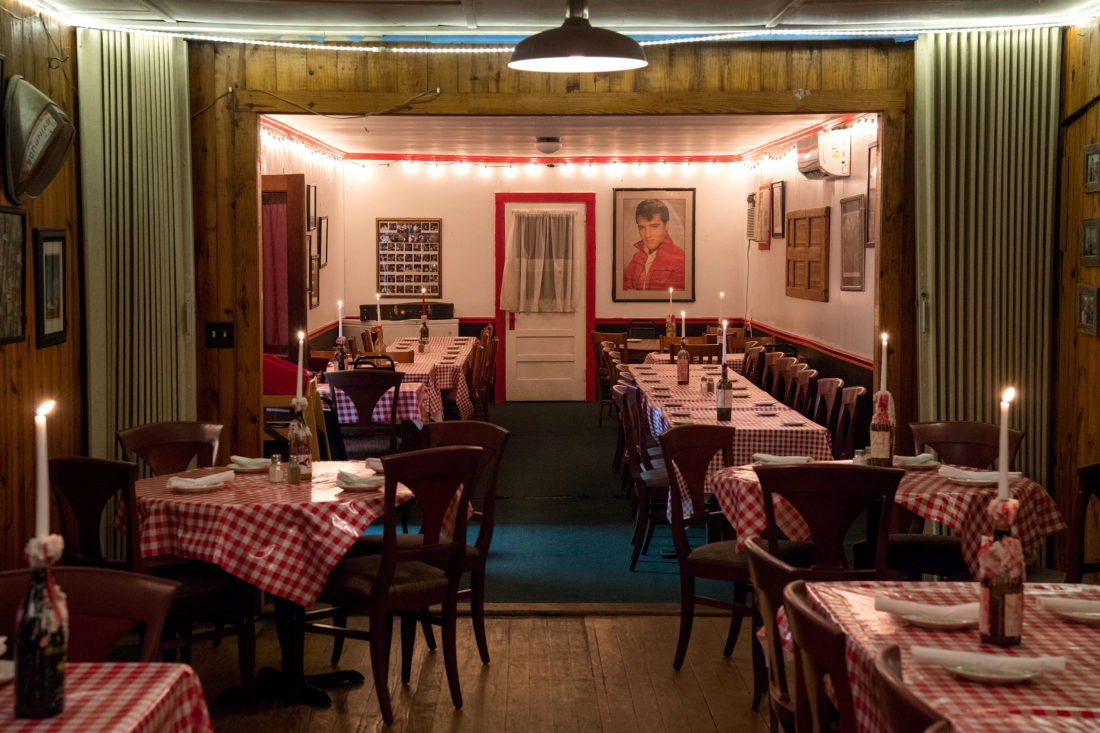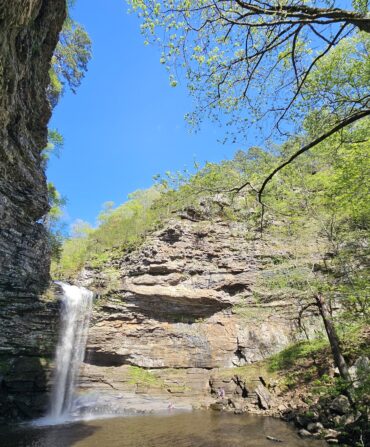We took our infant daughter to Moon Lake for our first family vacation last summer. It had been a long year, with lots of stress at work and the joy and exhaustion of a newborn. My wife, Sonia, and I needed a few days to stare at water. When we walked into the house, I turned my phone off. Two days later, I finally felt my adrenaline run out.
The wide trunks of old-growth cypresses line the banks of this oxbow off the Mississippi River, twenty-odd miles north of where I grew up in Clarksdale. Rickety piers and naked pilings—the skeletons of families and summers lost even to memory now—follow the lake’s curves. Every night we’re here, we head to our reserved corner table at an old Mississippi Delta roadhouse named Kathryn’s, a time capsule of a room that hums with wonderful light and the energy of red-and-white checkerboard tablecloths, and serves the best steak in Mississippi and the best pesto not made in Genoa or somewhere along Arthur Avenue in the Bronx.
The nights at Kathryn’s play out the same. We drink from a bottle of wine we brought, or sip from a fifth of whiskey—like all the best Mississippi joints, it’s BYOB. The owner, a beautiful singer-songwriter named John Mohead, pulls up a chair. There’s something symbolic about his owning this restaurant. His songs are a subtle examination of his Delta life, an attempt to make sense of the world the founders encountered when they arrived, the world they built and the one they left behind.
He grew up with Kathryn’s, opened by an Italian and Irish immigrant couple in 1939, and after it shut down and sat abandoned and forlorn for two years, he persuaded his wife that they should buy it and bring it back to life. He loves Moon Lake, and tells me this was the main channel of the river when Hernando de Soto first “discovered” a rolling black fist of water that had been flowing for eons. Some of the cypresses, he says, are more than four hundred years old. They stood watch over de Soto and his iron-chested soldiers, and over Frank and Kathryn Rossi when they created a little piece of Italy on the banks of a wild, renegade lake, and over John Mohead, and over me and Sonia and little Wallace. That idea really sticks with me, makes me feel at first sad and mortal and then an honest, joyous peace at the idea of the circle.
Kathryn’s red awning offers shade in the gravel parking lot. Inside, the music always seems perfect—as if the walls were singing. Sinatra and Tommy Dorsey and Bing Crosby and Dean Martin. Candle wax drips down old wine bottles on every table. The waitresses are quick with a corkscrew for a bottle of wine and with a hug and an ooh and an ahh for a baby. The parents of old friends ride over for dinner in their boats, tying up across narrow Moon Lake Road. I always see someone I know, someone who was taught by my mom or who was a fraternity brother of my dad’s, and without fail they are kind and warm. Everyone always seems genuinely happy for my minor successful turn in a public job at ESPN. It always feels like coming home. I have a collection of stories out in April—The Cost of These Dreams, buy it!—and the preface opens with a dinner at Kathryn’s.
It’s a Sunday. Back at the lake house, I can hear the drone of an outboard motor and the slapping of a bow on the early morning water. My wife is holding Wallace in the shade. The waves lap softly on the trunks of the trees and the rocks of the bank. Most of the people reading this live in a part of the world where we go to lakes. We build cabins and pass them down. Some survive. Some, like the ones that once populated the ghost piers I see in front of me, vanish faster than would have seemed possible back on some magic night with laughter rising into the candlelight, a pot of beans on the stove and catfish fillets rising to the top of hot oil.
Summer is ending. I can feel it. I heard a nearby high school football game in my backyard in Oxford a few days ago. By the time you read this, it will be spring again. If spring is the time for rebirth, and winter is for dying, then summer is a cosmic pause of reflection, where we are firmly in the middle of living. We are in between birth and death, the middle age of seasons.
Tennessee Williams wrote about Moon Lake, about gambling and drinking in the shady casino. My father used to party here, and I’ve heard terrifying and awesome stories of running Mustang convertibles down boat ramps and falling out of moving cars. Moon Lake is where generations of Mississippians have come to enact rituals, to trade one part of life for the next.
Today for breakfast at the house we had lunch meat sandwiches with Sonia’s homemade mayo. We washed them down with ice-cold beer. All is right in the world. Every time I’m in a home like this, I always think of buying it—not because I need it, or want it, or can afford it, but because I want to possess the feeling I have while I am there. We all instinctively know we will end up like the leaning poles ringing the water of Moon Lake: a little something for people to toast and maybe mourn but mostly just another thing that came and went while the cypress trees looked on without pity.
I think we build these lake houses—these cabins, the deer and duck camps, the fishing shacks—for escape, yes, but also for the exact opposite. As long as they exist and are used by loved ones, we may be found and seen and felt anew. Restaurants are like that, too. They are vaults in which we can leave vital and complicated ideas about home and family and our past and future, which we can plug into when we find the time to return. Safeguarding that is a heavy burden we place on the owners, like the Moheads here at Moon Lake.
Sonia takes Wallace inside for her nap. The sun is above me now. I hear bugs and water and the distant two-stroke acceleration of a prop. I think about last night. We took Wallace to Kathryn’s for the first time. She charmed the surrounding tables, smiling and laughing. Just for a moment, I remembered other nights in this room. Sonia and I wondered aloud if Wallace would ever come here and tell her friends that this fading, beautiful, vibrant, essential piece of Old Mississippi is where her mama and daddy brought her on her first summer vacation. We planned far-off birthday parties and anniversaries and then slipped back into the present, where we laughed and appreciated this miracle of a little girl.
For one of the few times I can remember, I was completely present. Wallace has so much ahead of her, heartbreaks and joys, successes and failures. One day she’ll need a port in the storm, but for now, she is in the first days of the spring of her life. Her parents are passing through late summer, together in a familiar restaurant on a hot August night, trying to hold enough of its warmth in their hearts to make it through the approaching cold.









